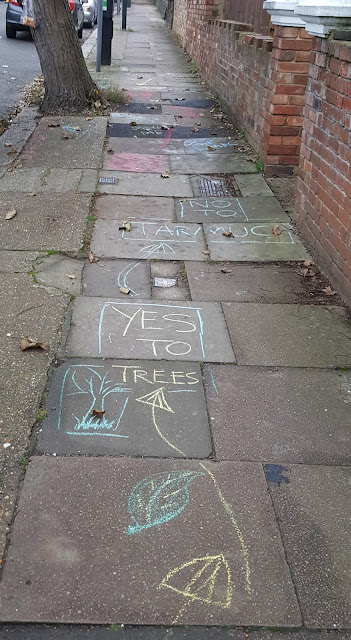So, continuing to look at what our neighbouring boroughs are doing and saying, here is Barnet Labour Party (in opposition) taking a rather different approach to Brent Labour (in power) on the tarmac versus paving debate. LINK:
Tarmac v Paving: Labour call for residents to be given a choice over pavement resurfacing
Labour councillors are calling for residents to be given a
choice between tarmac and paving slabs for pavement resurfacing after
receiving complaints about newly completed tarmac treatments in
Beresford Road, East Finchley, and a petition from residents living in
Granville Road N12.
The Granville Road petition, which will be discussed at the Finchley & Golders Green Area Committee
on 26 October,
says: “The overwhelming majority of people we spoke to do not want a
cheaper tarmac surface on the pavements if this is indeed the proposal.
There are many concerns about how it will look, that it will bring down
the appearance of the road, that it will be uneven, that it won't last
and will crack, that it will become sticky in the summer, that it will
encourage even more vehicle drivers to mount the pavement.”
The
petition also states that residents are given only two weeks’ notice of
pavement works with no real way to respond as the contact number given
on the letters is not answered and messages left have not been returned
by the Council.
Barnet Council has received seven separate complaints from residents
in Beresford Road about the tarmac resurfacing recently completed there
which has
featured in the Evening Standard on 13 October.
The
Conservative-run Council are planning to save £550,000 in reactive road
and pavement maintenance by moving to different resurfacing methods.
For pavements this means completely replacing paving with tarmac or
using tarmac with some block paving for vehicle crossovers and margins.
Only pavements in town centres and conservation areas will have paving
slabs replaced.
The new tarmac pavement treatments form part of
plans by the Council to spend £50m on road and pavement resurfacing
across the borough between 2015-2020.
However, the Council’s published news release on the issue (20 October) showed a picture of paving slabs being used rather than tarmac. Labour councillors believe this is misleading to the public.
The letters sent to residents have also been totally misleading as they
have stated "we will be laying paving in your road", despite the fact
the Council intends to use tarmac.
Labour councillors have also
highlighted complaints from residents about the cheaper road surface dressing that leaves loose chips on roads.
Repair of roads and quality of pavements are two of the
lowest rated universal services in Barnet according to the Council’s
most recent Residents’ Perception Survey.
Only 27%
of residents responding to the Survey rated repair of roads highly – 14%
points lower than London (41%), and down 8% points from autumn 2015
(35%); and only 33% of residents rated quality of pavements highly – 8%
points lower than London (41%), and down 1% point on autumn 2015 (34%).
The Survey also showed that the state of roads and pavements is the second highest concern amongst residents.
Barnet Labour's Environment Spokesperson, Cllr Alan Schneiderman said:
The decision to use tarmac rather than paving stones has
been imposed without residents being consulted. Residents have also
been misled by being sent letters saying that paving will be laid in
their road when in fact they have no choice but tarmac.
We
need to do all we can to minimise trips and falls and repair footways,
but I want to see residents given a choice between using paving stones
or tarmac for their road.
Wembley Matters additional comment:
Just in case one of the Brent Conervatibe groups wants to take up the issue this is what Barnet Conservatives (in power) had to say
LINK:
According to Cllr Dean Cohen, Conservative for Golders Green, asphalt
is being used in “appropriate areas” because it is “safer, more durable
and cheaper to maintain over their life”.
Cllr Cohen, who chairs the environment committee, said: “We know that
the quality of pavements is a top priority for residents which is why we
are investing £8m this year alone on footways.
“Asphalt surfaces enable a greater number of roads to benefit from the
programme of investment – this was a committee decision which Labour
members did not oppose.
“The council will continue to engage with residents as clearly as possible ahead of work taking place."











